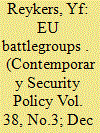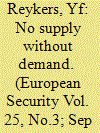| Srl | Item |
| 1 |
ID:
156091


|
|
|
|
|
| Summary/Abstract |
This article reviews the gloomy saga of the EU Battlegroups, focusing on four questions: Where do they come from? What do they look like? What have they been hindered by? And where do they go from here? It builds upon earlier findings in the literature and adds novel insights based on original data. In doing so, the article pays particular attention to the standby nations’ constant calculation of political and financial costs. It argues that recognizing these cost–benefit calculations allows for identifying the most crucial areas to be tackled to make the EU Battlegroups functional. In addition, the article stresses that these considerations play out in a setting wherein the Battlegroups are just one among many policy instruments available for rapid response.
|
|
|
|
|
|
|
|
|
|
|
|
|
|
|
|
| 2 |
ID:
146998


|
|
|
|
|
| Summary/Abstract |
Although the sad track record of the EU Battlegroups has attracted considerable scholarly attention, analyses have largely focused on obstacles related to the provision of the Battlegroup troops and to the consensus within the EU Council, hence taking a supply-side perspective. This article calls for complementing this perspective with an analysis of the demand for their deployment. That implies analysing whether and why the EU Battlegroups were (not) considered as an option by those actors taking the initiative to intervene in a particular crisis. Applying a rational-institutionalist approach, this article explains the absence of the Battlegroups from three recent crises: Libya (2011), Mali (2013) and the Central African Republic (2013–2014). Using data from document analysis and elite interviews, it shows that once a rapid military reaction became urgent, the EU Battlegroups were not even considered as an option by those initiating an international reaction.
|
|
|
|
|
|
|
|
|
|
|
|
|
|
|
|
| 3 |
ID:
098419


|
|
|
|
|
| Publication |
2009.
|
| Summary/Abstract |
Scholars have largely overlooked a critical influence on the effectiveness of organizations in their conduct of peace operations: response duration. The consequences of prolonging the time between the demand and supply of a peace operation often include a rise in the death toll on the ground and a fall in the operation's legitimacy in the eyes of the local population. This paper aims to present and explain surprising variation among regional organizations' response rates - a critical influence on operations' prospects for success. The evidence that I have collected shows that despite its relative superior capacity, the European Union responds more slowly than the African Union and other less affluent regional organizations conducting similar peace operations. Applying theories of international organization pathologies, the paper argues that institutional design problems of bureaucratic dysfunction hinder organizations' abilities to rapidly respond.
|
|
|
|
|
|
|
|
|
|
|
|
|
|
|
|